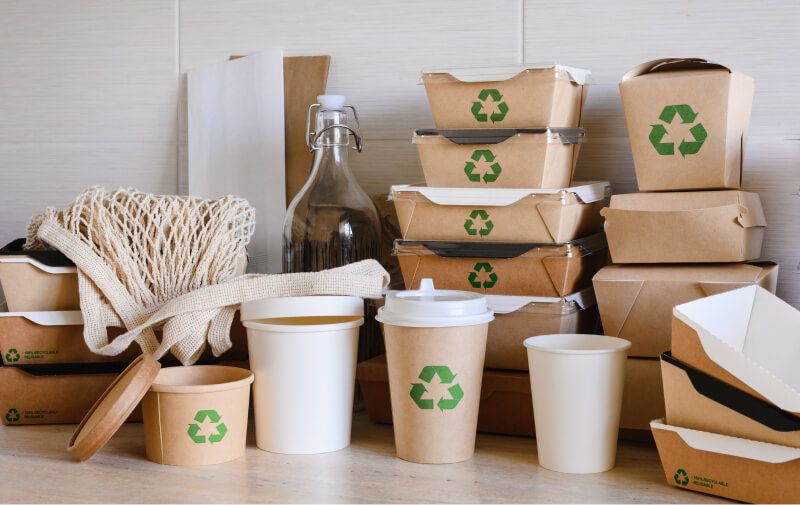Generative AI in Packaging Market Analysis – Size, Share, and Forecast Outlook 2025 to 2035
The global generative AI in packaging market is expected to expand from USD 823.2 million in 2025 to approximately USD 10,836 million by 2035, recording an absolute increase of USD 10,012.7 million over the forecast period. This translates into a total growth of 1,216.4%, with the market forecast to expand at a compound annual growth rate (CAGR) of 29.4% between 2025 and 2035. The overall market size is expected to grow by nearly 13.2X during the same period, supported by the rising adoption of AI-powered design automation and increasing demand for personalized packaging solutions across consumer goods and retail industries worldwide.
Quick Stats for Generative AI in Packaging Market
Generative AI in Packaging Market Value (2025): USD 823.2 million
Generative AI in Packaging Market Forecast Value (2035): USD 10,836 million
Generative AI in Packaging Market Forecast CAGR: 29.4%
Leading Component in Generative AI in Packaging Market: Software (67%)
Leading Technology in Generative AI in Packaging Market: Machine Learning (27%)
Leading Application in Generative AI in Packaging Market: Structural Design (34.3%)
Leading Deployment in Generative AI in Packaging Market: Cloud (70%)
Leading End Use in Generative AI in Packaging Market: Food & Beverages (26%)
Key Growth Regions in Generative AI in Packaging Market: China, India, and Germany
Key Players in Generative AI in Packaging Market: Adobe Inc., Amazon.com, Inc., NVIDIA Corporation, Microsoft, Clarifai, PackageX Inc., Smurfit Kappa Group and WestRock Company, Dassault Systèmes SE, Accenture, Kebotix, Inc.
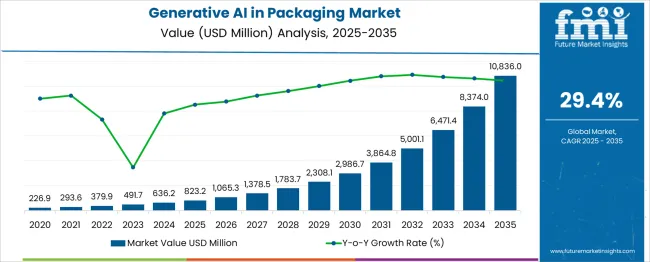
Between 2025 and 2030, the generative AI in packaging market is projected to expand from USD 823.24 million to USD 3,012.45 million, resulting in a value increase of USD 2,189.21 million, which represents 21.9% of the total forecast growth for the decade. This phase of growth will be shaped by rising adoption of AI-powered design automation, increasing demand for sustainable packaging solutions, and growing emphasis on personalized consumer experiences. Technology providers are expanding their AI capabilities to address the growing complexity of packaging design requirements across diverse industry verticals.
From 2030 to 2035, the market is forecast to grow from USD 3,012.45 million to USD 10,836.01 million, adding another USD 7,823.56 million, which constitutes 78.1% of the overall ten-year expansion. This period is expected to be characterized by widespread deployment of advanced generative models, integration of AI with augmented reality visualization, and development of comprehensive packaging optimization platforms. The growing emphasis on circular economy principles and zero-waste packaging will drive demand for more sophisticated AI solutions with enhanced eco-efficiency optimization and material efficiency capabilities.
Generative AI in Packaging Market Key Takeaways
Metric
Value
Estimated Value in (2025E)
USD 823.2 million
Forecast Value in (2035F)
USD 10,836 million
Forecast CAGR (2025 to 2035)
29.4%
Why the Generative AI in Packaging Market is Growing?
Market expansion is being supported by the rapid increase in e-commerce activities worldwide and the corresponding need for innovative packaging solutions that can provide brand differentiation, consumer engagement, and supply chain optimization. Modern packaging design relies on generative AI to create unique designs, optimize material usage, and personalize packaging for individual consumer preferences while maintaining cost-effectiveness and eco-efficient objectives. The growing complexity of packaging requirements and increasing emphasis on brand experience are driving demand for AI-powered design solutions from certified technology providers with appropriate machine learning expertise and creative capabilities.
The expanding consumer demand for sustainable packaging and rising environmental regulations are creating significant opportunities for AI solutions that can optimize packaging structures, reduce material waste, and identify eco-friendly alternatives while maintaining product protection and aesthetic appeal. Government initiatives promoting digital transformation and sustainable manufacturing practices are establishing new frameworks that support AI adoption in packaging design and production processes.
Segmental Analysis
The market is segmented by component, technology, application, deployment, end use, and region. By component, the market is divided into software and services. Based on technology, the market is categorized into machine learning (ML), natural language processing (NLP), generative adversarial networks (GANs), 3D generative design tools, and others. In terms of application, the market is segmented into structural design, label and artwork generation, eco-efficient optimization, consumer personalization, marketing visualization, simulation and testing, and others. By deployment, the market includes cloud and on-premises solutions. End use sectors comprise food and beverages, consumer goods, pharmaceuticals, retail and e-commerce, cosmetics and personal care, industrial goods, and others. Regionally, the market is divided into North America, Europe, East Asia, South Asia & Pacific, Latin America, and Middle East & Africa.
By Component, Software Segment Accounts for 67% Market Share

Software is projected to account for 67% of the generative AI in packaging market in 2025. This leading share is supported by the fundamental role of AI software platforms in enabling automated design generation, pattern creation, and packaging optimization across diverse industry applications. Software solutions provide essential capabilities for machine learning model training, creative automation, and integration with existing design workflows. The segment benefits from continuous algorithm advancement and comprehensive cloud-based deployment options that support scalable AI implementation.
By Technology, NLP Segment Accounts for 30.9% Market Share
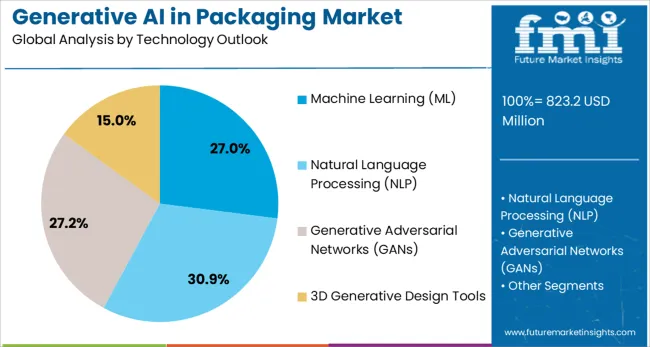
NLP is expected to represent 30.9% of the technology segment in 2025. Natural Language Processing (NLP) is in demand for AI in packaging because it enables smarter interaction between packaging, brands, and consumers. Companies use NLP to analyze unstructured text data such as customer reviews, product feedback, and regulatory documents to design packaging that meets consumer expectations and compliance requirements. NLP also powers intelligent labeling, where QR codes or smart tags can provide dynamic product details, instructions, or sustainability information in multiple languages.
By Application, Structural Design Segment Accounts for 34.3% Market Share
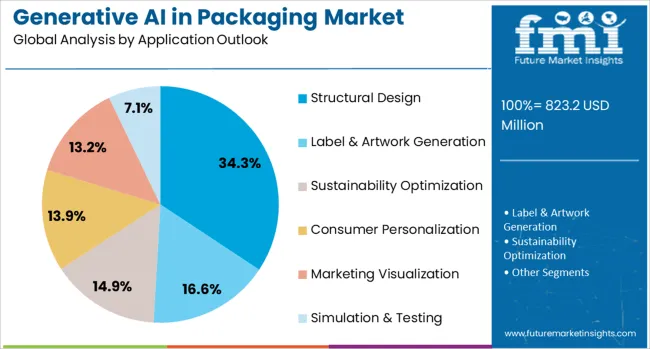
Structural design applications are projected to contribute 34.3% of the application segment in 2025. This substantial share reflects the critical importance of AI in optimizing packaging structures for material efficiency, protection performance, and manufacturing feasibility. Structural design AI applications enable automated generation of packaging geometries, optimization of material distribution, and simulation of performance characteristics. The segment is supported by increasing demand for sustainable packaging solutions and cost optimization requirements.
By Deployment, Cloud Segment Accounts for 70% Market Share
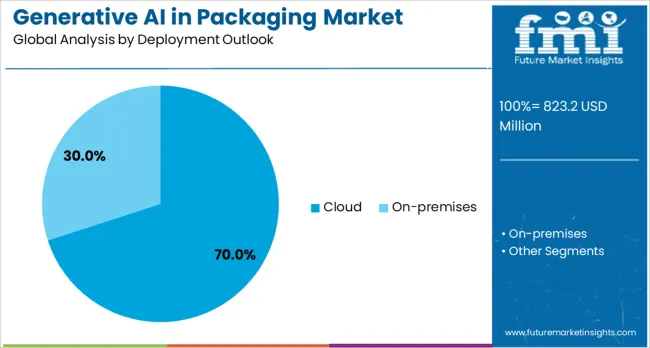
Cloud deployment is estimated to hold 70% of the deployment segment share in 2025. This dominance reflects the scalability advantages and cost-effectiveness of cloud-based AI solutions for packaging design applications. Cloud deployment enables access to powerful computing resources, collaborative design environments, and continuous model updates without significant infrastructure investment. The segment benefits from increasing enterprise cloud adoption and comprehensive integration capabilities with existing business systems.
By End Use, Food & Beverages Segment Accounts for 26% Market Share
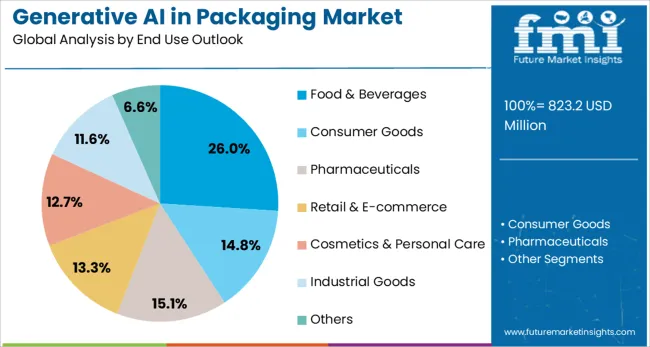
Food and beverages sector is projected to represent 26% of the end use segment in 2025. This leading share reflects the large market size and diverse packaging requirements of the food and beverage industry, including product protection, shelf appeal, and regulatory compliance needs. Food packaging applications require AI solutions that can address safety requirements, consumer preferences, and eco-efficient objectives while maintaining cost-effectiveness. The segment benefits from increasing consumer demand for personalized products and sustainable packaging solutions.
What are the Drivers, Restraints, and Key Trends of the Generative AI in Packaging Market?
The generative AI in packaging market is advancing rapidly due to increasing demand for personalized consumer experiences and growing recognition of AI potential for design automation and optimization. However, the market faces challenges including high implementation costs, need for specialized technical expertise, and concerns regarding creative control and intellectual property protection. Technology validation and integration complexity continue to influence market development and adoption strategies.
Expansion of Sustainable Design Optimization and Circular Economy Applications
The growing deployment of AI algorithms for sustainable packaging design and circular economy optimization is enabling significant material waste reduction while maintaining product protection and consumer appeal. Sustainable design AI provides enhanced capability for material selection optimization, end-of-life planning, and comprehensive lifecycle assessment integration. These advanced applications are particularly valuable for companies with eco-efficient commitments where packaging optimization directly impacts environmental performance and regulatory compliance.
Integration of Augmented Reality and Consumer Personalization Technologies
Modern generative AI platforms are incorporating augmented reality visualization and real-time personalization capabilities that enable interactive packaging design and consumer engagement optimization. Integration of AR technologies and personalization algorithms enables dynamic packaging adaptation based on consumer preferences, demographic data, and purchase behavior patterns. Advanced personalization systems also support mass customization capabilities and targeted marketing campaign optimization across diverse consumer segments.
Analysis of Generative AI in Packaging Market by Key Country
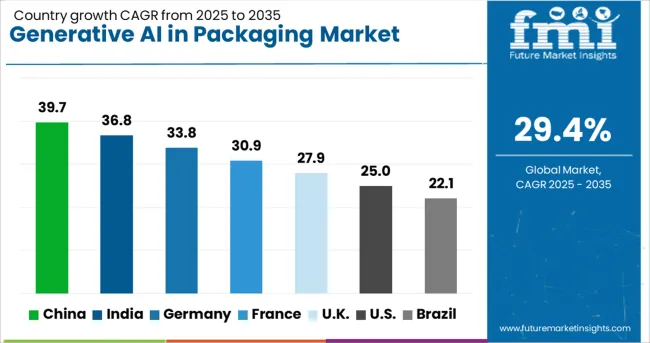
Country
CAGR (2025 to 2035)
China
39.7%
India
36.8%
Germany
33.8%
France
30.9%
United Kingdom
27.9%
United States
25%
Brazil
22.1%
The generative AI in packaging market demonstrates exceptional growth across major economies, with China leading at a 39.7% CAGR through 2035, driven by massive manufacturing capabilities and increasing AI technology investment. India follows at 36.8%, supported by growing consumer goods production and expanding technology adoption. Germany records 33.8% growth, emphasizing manufacturing innovation and sustainable packaging development. France shows 30.9% expansion, driven by luxury goods packaging and creative industry requirements. The United Kingdom demonstrates 27.9% growth, focusing on e-commerce packaging and consumer experience optimization. The United States records 25% growth, supported by established technology infrastructure, while Brazil grows at 22.1% with developing AI capabilities.
The report covers an in-depth analysis of 40+ countries; seven top-performing countries are highlighted below.
China Leads Global Market Growth with Manufacturing Capabilities and AI Investment
Revenue from generative AI in packaging in China is projected to exhibit the highest growth rate with a CAGR of 39.7% through 2035, driven by comprehensive government AI development initiatives and massive manufacturing infrastructure supporting packaging production across diverse industry sectors. The country’s expanding consumer goods manufacturing and increasing emphasis on export competitiveness are creating significant demand for AI-powered packaging design and optimization solutions. Major manufacturing companies and technology providers are establishing comprehensive AI platforms to support the growing requirements of packaging innovation and market differentiation.
Government AI development policies are mandating advancement of artificial intelligence capabilities in manufacturing sectors including packaging design and production, driving investment in generative AI technologies throughout major industrial and consumer goods manufacturing regions. Digital transformation programs are supporting establishment of advanced AI research facilities and international collaboration initiatives that enhance packaging innovation capabilities across manufacturing networks.
Government AI initiatives create extensive opportunities for generative AI technology providers serving comprehensive packaging design and manufacturing optimization requirements.
Manufacturing infrastructure expansion enhances AI adoption capabilities and technology development, enabling advanced packaging innovation across major consumer goods and export sectors.
India Demonstrates Strong Market Potential with Consumer Goods Growth and Technology Adoption
Revenue from generative AI in packaging in India is expanding at a CAGR of 36.8%, supported by rapidly growing consumer goods manufacturing and increasing adoption of AI technologies across packaging design and production applications. The country’s expanding middle-class consumer market and rising demand for branded products are driving interest in AI solutions that can accelerate packaging development and enhance consumer appeal. Technology companies and consumer goods manufacturers are gradually establishing AI capabilities to serve the growing requirements of packaging innovation and market competitiveness.
Consumer goods sector development and technology modernization initiatives are creating opportunities for generative AI solution providers that can deliver cost-effective platforms and comprehensive design support services. Professional technology development and manufacturing training programs are building AI expertise among design professionals, enabling packaging innovation that meets international quality standards and consumer expectations.
Consumer goods manufacturing expansion creates extensive demand for generative AI solutions meeting both innovation acceleration and cost-effectiveness requirements.
Technology adoption enhancement programs enable AI platform deployment across diverse packaging applications and manufacturing sectors.
Germany Focuses on Manufacturing Innovation and Sustainable Packaging Development
Demand for generative AI in packaging in Germany is projected to grow at a CAGR of 33.8%, supported by the country’s emphasis on manufacturing innovation and comprehensive sustainable packaging development initiatives. German consumer goods and packaging companies are implementing advanced AI systems that meet stringent environmental standards and quality requirements. The market is characterized by focus on engineering excellence, eco-efficient optimization, and compliance with comprehensive environmental regulations.
Manufacturing industry investments are prioritizing AI technologies that demonstrate superior eco-efficient performance and innovation capabilities while meeting German environmental standards and circular economy requirements. Professional engineering and design certification programs are ensuring comprehensive technical expertise among packaging professionals, enabling specialized AI applications that support diverse consumer goods applications and export requirements.
Manufacturing innovation focus creates extensive opportunities for generative AI technologies meeting comprehensive eco-efficient optimization and engineering excellence requirements.
Sustainable packaging development programs drive adoption of AI solutions supporting environmental compliance and circular economy objectives.
France Emphasizes Luxury Goods Packaging and Creative Industry Requirements
Demand for generative AI in packaging in France is expanding at a CAGR of 30.9%, driven by luxury goods industry requirements and comprehensive creative industry advancement across design and packaging sectors. French luxury goods and consumer products companies are incorporating advanced AI technologies that support premium packaging design and brand differentiation objectives. The market benefits from established design expertise and comprehensive government support for creative technology advancement.
Luxury goods industry development programs are facilitating adoption of AI solutions that provide enhanced design capabilities and creative automation while supporting French luxury brand positioning and global competitiveness. Professional creative development initiatives are ensuring comprehensive capabilities among design professionals, enabling specialized AI technology deployment that meets evolving luxury goods requirements and international market standards.
Luxury goods industry creates extensive opportunities for generative AI technologies supporting premium packaging design and brand differentiation requirements.
Creative industry advancement enhances AI adoption capabilities, enabling specialized design automation across diverse luxury and consumer goods applications.
United Kingdom Focuses on E-commerce Packaging and Consumer Experience Optimization
Demand for generative AI in packaging in the United Kingdom is projected to grow at a CAGR of 27.9%, supported by extensive e-commerce activities and emphasis on consumer experience optimization across retail and consumer goods sectors. British retailers and consumer goods companies are implementing AI solutions that enhance packaging functionality and consumer engagement within digital commerce environments. The market is characterized by focus on customer experience innovation, omnichannel retail integration, and comprehensive consumer data utilization.
E-commerce sector investments are enabling deployment of AI technologies that provide enhanced packaging personalization and logistics optimization capabilities while supporting UK retail competitiveness and customer satisfaction objectives. Professional retail development programs are ensuring specialized expertise among packaging professionals, enabling comprehensive AI applications supporting evolving e-commerce requirements and consumer expectations.
E-commerce expansion creates extensive opportunities for generative AI technologies meeting comprehensive packaging optimization and consumer experience requirements.
Consumer experience focus enhances AI development capabilities, providing specialized packaging solutions supporting diverse retail and digital commerce applications.
United States Emphasizes Technology Infrastructure and Innovation Leadership
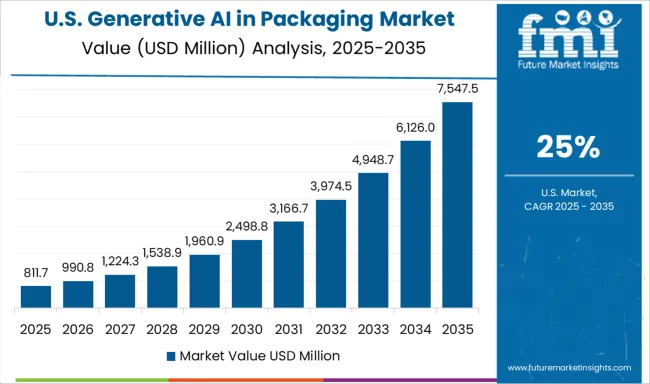
Demand for generative AI in packaging in the United States is expanding at a CAGR of 25%, driven by established technology infrastructure and continued innovation in AI applications for packaging design and consumer goods manufacturing. American technology companies and consumer goods manufacturers are maintaining comprehensive AI capabilities through adoption of advanced algorithms and cloud-based platforms. The market benefits from substantial venture capital investment and established technology industry leadership.
Technology sector investments are enabling continued advancement of AI packaging applications through integration of innovative algorithms and comprehensive design automation platforms. Professional development programs are maintaining technical expertise among design and technology professionals, enabling comprehensive AI capabilities that support diverse consumer goods requirements and emerging packaging applications.
Established technology infrastructure enables comprehensive generative AI deployment leveraging advanced algorithms and cloud-based platforms.
Innovation leadership programs enhance development capabilities, providing cutting-edge AI solutions supporting diverse packaging design and consumer goods applications.
Brazil Maintains Growth with Developing AI Capabilities and Consumer Goods Expansion
Revenue from generative AI in packaging in Brazil is growing at a CAGR of 22.1%, driven by developing AI technology capabilities and expanding consumer goods manufacturing across major economic regions. Brazilian consumer goods companies and packaging manufacturers are investing in AI technologies that can support design acceleration and market competitiveness. Technology providers and manufacturing companies are establishing AI capabilities to serve evolving packaging requirements.
Consumer goods development programs are facilitating adoption of generative AI technologies that support comprehensive packaging design applications across diverse product categories and market segments. Professional technology capability development initiatives are enhancing AI expertise among design professionals, enabling packaging innovation that meets evolving consumer requirements and international market standards.
Consumer goods expansion creates opportunities for generative AI solution providers serving comprehensive packaging design and manufacturing competitiveness requirements.
AI capability development programs enable advanced technology adoption meeting diverse consumer goods and export market needs.
Europe Market Split by Country
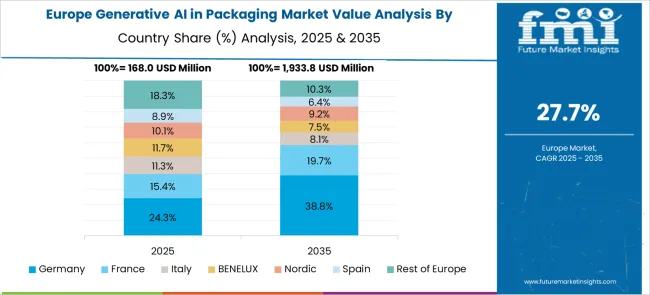
The generative AI in packaging market in Europe is projected to grow substantially across major countries, with Germany leading the regional market development. The United Kingdom maintains strong interest in AI packaging technologies, supported by established consumer goods companies and comprehensive design industry presence. France demonstrates consistent investment in AI innovation, driven by luxury goods packaging requirements and creative industry advancement.
Germany is expected to maintain its leadership position in European generative AI packaging adoption, supported by its advanced manufacturing infrastructure and established consumer goods industry presence. The country benefits from comprehensive AI research capabilities and supportive regulatory environment for technology innovation.
Competitive Landscape of Generative AI in Packaging Market
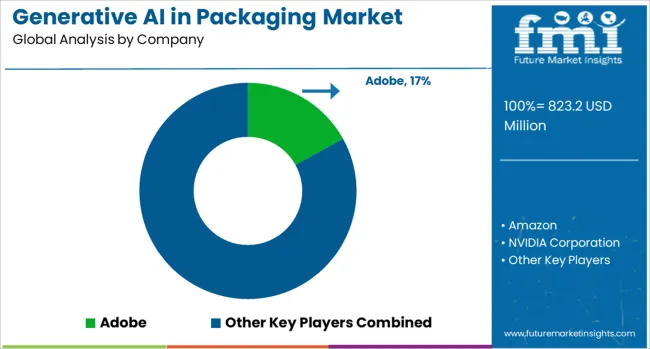
The generative AI in packaging market is defined by competition among technology companies, software platforms, and specialized AI solution providers. Companies are investing in advanced machine learning algorithms, comprehensive design automation platforms, cloud-based infrastructure, and domain expertise to deliver innovative, scalable, and cost-effective packaging AI solutions. Strategic partnerships, platform development, and industry collaboration are central to strengthening technology portfolios and market expansion.
Adobe Inc., United States-based, offers comprehensive creative AI platforms with focus on design automation and visual content generation for packaging applications. Amazon.com, Inc., United States, provides cloud-based AI services and machine learning infrastructure supporting packaging optimization and e-commerce integration. NVIDIA Corporation, United States, delivers advanced AI computing platforms and machine learning frameworks for packaging design acceleration. Microsoft, United States, emphasizes cloud AI services and comprehensive business intelligence integration for packaging optimization. Clarifai, United States, focuses on computer vision and AI-powered image recognition for packaging applications. PackageX Inc., United States, provides specialized packaging AI solutions and logistics optimization platforms. Smurfit Kappa Group and WestRock Company, global operations, offers integrated packaging solutions with AI-powered design capabilities. Dassault Systèmes SE, France, Accenture, global operations, and Kebotix, Inc., United States, provide specialized AI expertise, comprehensive consulting services, and innovative technology solutions across global packaging design and manufacturing markets.
Key Players in the Generative AI in Packaging Market
Adobe Inc.
Amazon.com, Inc.
NVIDIA Corporation
Microsoft
Clarifai
PackageX Inc.
Smurfit Kappa Group and WestRock Company
Dassault Systèmes SE
Accenture
Kebotix, Inc.
Scope of the Report
Item
Value
Quantitative Units
USD 823.2 million
Component
Software, services
Technology
Machine learning (ML), natural language processing (NLP), generative adversarial networks (GANs), 3D generative design tools, others
Application
Structural design, label & artwork generation, eco-efficiency optimization, consumer personalization, marketing visualization, simulation & testing, others
Deployment
Cloud, on-premises
End Use
Food & beverages, consumer goods, pharmaceuticals, retail & e-commerce, cosmetics & personal care, industrial goods, others
Regions Covered
North America, Europe, East Asia, South Asia & Pacific, Latin America, Middle East & Africa
Country Covered
United States, Canada, United Kingdom, Germany, France, China, Japan, South Korea, India, Brazil, Australia and 40+ countries
Key Companies Profiled
Adobe Inc., Amazon.com, Inc., NVIDIA Corporation, Microsoft, Clarifai, PackageX Inc., Smurfit Kappa Group and WestRock Company, Dassault Systèmes SE, Accenture, Kebotix, Inc.
Additional Attributes
Dollar sales by component, technology, application, deployment, and end use, regional demand trends across North America, Europe, and Asia-Pacific, competitive landscape with established technology companies and specialized AI solution providers, development capabilities for different packaging applications and industry requirements, integration with advanced machine learning algorithms and cloud computing platforms, innovations in sustainable design optimization and consumer personalization technologies, and adoption of comprehensive packaging automation systems with enhanced creative capabilities and environmental compliance optimization.

